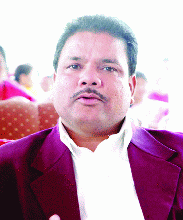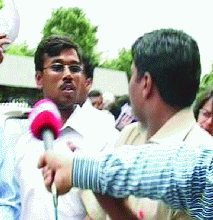Archives
The Corruption of Journalism
The immediate reaction of the people in general and media persons in particular was that Mukul got nothing but his dues. Meanwhile wild allegations were poured against the young scribe claiming that he managed to get a hundred thousand rupees through his unethical understanding and activities with the minister. A few journalists came out with the more serious charge that Mukul has destroyed the image of the Assam media to the greatest extent. So there were hot debates and discussions about the punishment that could be pronounced to Mukul, who was then under judicial custody at Tihar jail. If the CBI can arrest him for his involvement in the episode of bribing one of its officers with Rs 10,00,000 in cash by the minister, why can’t the journalists’ body condemn and expel him from the community-many journalists questioned. There was however little voice in support of Mukul to explain his stand in the situation. It was a general understanding that if Mukul was arrested by the CBI (which can never do wrong!); he must have been a criminal. And hence there was no point discussing his side of the story or wait for the final verdict of the court regarding the episode.
But a recent journalists’ meeting at Guwahati Press Club changed the face of anger against Mukul. Organized by the Journalists’ Action Committee, Assam and the representative of National Federation of Newspaper Employees, the meeting insisted on providing space for Mukul to clarify his stand at the earliest. Presided over by a journalist Keshab Kalita, the meeting also decided to send a delegation of journalists to New Delhi to meet Mukul and pick up his explanation of the incident. The delegation was supposed to meet the concerned CBI officials as well. Various speakers in the meeting were unanimous in asserting that Mukul could never be ‘the only and the last tainted reporter’, working in Assam for various media houses. It was observed that a section of journalists tried to establish this with their comments soon after the incident. Hence they urged the editors to keep a vigil on the working journalists of the respective media houses.
Various speakers in the meeting were unanimous in asserting that Mukul could never be ‘the only and the last tainted reporter’, working in Assam for various media houses. It was observed that a section of journalists tried to establish this with their comments soon after the incident. Hence they urged the editors to keep a vigil on the working journalists of the respective media houses.
“If Mukul is proved to be involved in the episode, for which he was arrested by the CBI, the journalists’ body would support appropriate actions against the reporter. He will also be expelled from the journalists’ body.” This was a resolution of the meeting.
In another resolution, the meeting demanded the minimum salary and other economic facilities to the working journalists of Assam. Speakers including Prakash Mahanta (a senior journalist and the secretary of Journalists Action Committee, Assam), Sabita Lahkar (editor of an Assamese monthly, Ajori), Mukul Kalita and Naresh Kalita (both Guwahati based senior journalists) expressed resentment at the disappointing conditions of the working journalists of the state, where over 60% of them are compelled to work without a proper appointment letter, salary structure, leave and other relevant facilities, which are all recommended by various laws including the Indian Labour Act. The meeting was also addressed by Pankaj Dutta, Neetumoni Saikia, Samir Sandilya, Nayanjyoti Bhuyan (all reporters associated with vernacular media) etc.
“This is very unfortunate that media persons in Assam have to work with a salary starting as low as with even Rs. 2000 with absolutely no job security. Many times, the journalists (including the editors) are used by the proprietors of media groups for their business (other than media) interest. So in such a chaotic situation, we can hardly expect fair journalism in the state,” commented a Guwahati based senior citizen, Dimbeswar Talukder. He however added that it was not only the local and less paid scribes, who were engaged in corrupt means, a section of established journalists (belonging to news agencies and metro dailies) with adequate financial security are also indulging in such kinds of activities.
His comment was supported by a city based scribe, Haren Kalita, who said that there were many journalists, who pursued unethical means for personal benefits. “Why are you making so much noise against the poor reporter (Mukul Pathak)? Do you not know that many so-called senior and responsible journalists were equally involved in corrupt practices? They only do it in a more polished manner so nobody finds it worth bothering themselves over,” he commented.
pursued unethical means for personal benefits. “Why are you making so much noise against the poor reporter (Mukul Pathak)? Do you not know that many so-called senior and responsible journalists were equally involved in corrupt practices? They only do it in a more polished manner so nobody finds it worth bothering themselves over,” he commented.
Devashish Bhattacharjee, another city based reporter raised a vital point, “Take an example. We have a number of journalists cum documentary film makers (employed with professional media houses) in the city, who work for the Prasar Bharati (Broadcasting Corporation of India). There may be nothing wrong in producing documentaries for Doordarshan, but when one does it on some government departments, it might turn sour. Suppose, one proposes productions related to the state forest department and takes all the possible advantages (from conveyance to lodging in forest guest houses) from the department while shooting, is this too not unethical? Because the producers had already received (or will receive) the money against all relevant expenditures from Prasar Bharati, then why should he should go begging for extra support from the department? Will he be able to raise his voice (to file news) against the department in future in a credible way?”
Bhattacharjee wrapped up with a final say, “Was this not exactly the cause of many journalists in Assam ignoring the public resentment against the state forest department during the last few months for its failure to protect the endangered one horned rhinos in various national preserves? Those journalists remained silent while the conscious people of the state took to the streets condemning the state forest minister for his negligence of his duties, but they were too quick to report when the minister or the forest officials came out with their statements (though many times those were proved useless). Is this not the face of corruption rearing its masked face?

